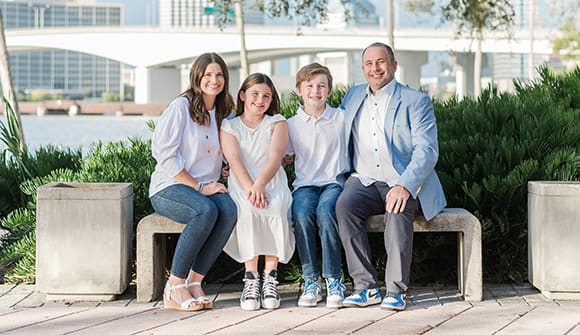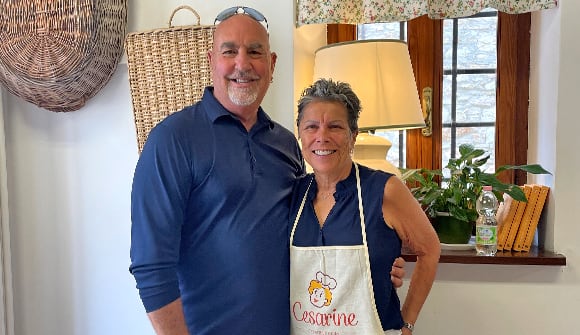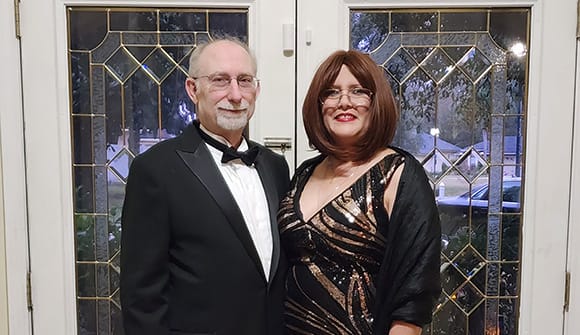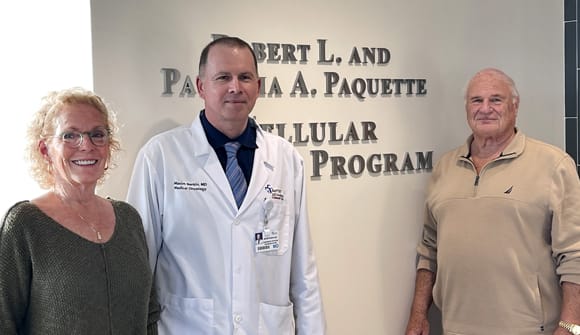‘I thought I was way too young’
Cancer survivor’s message: Don’t dismiss symptoms or delay screenings.
Article Author: Juliette Allen
Article Date:

“It’s so much better to be proactive than reactive.”
Jake Gordon shared that simple message almost exactly five years after he was diagnosed with a rare and aggressive cancer. Now 48, the CEO of Downtown Vision in Jacksonville is urging his peers to take symptoms seriously and push for answers if they suspect something might be wrong with their health.
“No one knows your body as well as you do,” he said.
From pain and tingling to Stage 2 cancer
Gordon first started having vague symptoms more than a year before his diagnosis. He attributed the abdominal pain and on-and-off tingling to lifestyle factors; they seemed to improve when he slept more, reduced his stress, ate healthier and limited how much alcohol he consumed. Still, after several Emergency Room visits, a colonoscopy and an ultrasound, he didn’t have any answers.
Finally, in November 2019, doctors decided to remove his appendix. It turned out to be a life-saving decision.
“My appendix didn’t look enflamed on the ultrasound, but there was a big tumor in it that was cutting off the blood supply to my body. That’s what was causing the tingling and pain,” Gordon said.
The diagnosis: appendiceal goblet cell adenocarcinoma, a rare and aggressive cancer of the appendix.
“I knew something was wrong, but it never crossed my mind that it could be cancer. I thought I was way too young,” the husband and father of two recalled. “You really know what’s important in that moment. I’m not just fighting for me; I’m fighting for my kids, my wife Dana, and my whole family.”
“This cancer can often mimic appendicitis,” explained Robert Zaiden, MD, a medical oncologist with Baptist MD Anderson Cancer Center. “A lot of the cases are found incidentally when someone is doing an appendectomy, as was the case for Jake.”
Gordon needed an additional surgery to determine how advanced the cancer was. Ron Landmann, MD, FACS, chief of Colon and Rectal Surgery at Baptist MD Anderson, performed the procedure to remove part of his colon.
“When you have an appendiceal cancer, you need to evaluate all the lymph nodes to determine the stage of the cancer,” Dr. Landmann explained. “For that reason, anyone with an appendiceal cancer has to have a right colectomy, which includes resection [removal] of the right colon, appendix and the lymph nodes that drain fluid from both organs.”
Following the procedure, Gordon was officially diagnosed at Stage 2. All cancerous tissue had been successfully removed, and he didn’t need any additional treatment, just routine monitoring for the next five years.

Gordon remained optimistic throughout his battle with cancer. He now advocates for his peers to be screened.
Troubling trend: Cancer in adults under 50
Gordon, who was just 43 when he was diagnosed, is part of a startling nationwide trend of an increase in cancers in adults under 50. Both Dr. Landmann and Dr. Zaiden have personally seen a rise in patients in this age range in recent years.
“We think it’s a complex interplay between environmental factors – especially early life exposure to carcinogens [cancer-causing substances] – but also unhealthy diets and sedentary lifestyles,” said Dr. Zaiden.
Although Gordon’s cancer wasn’t and wouldn’t have been found during a colonoscopy, he’s made it his mission to encourage this particular screening for his peers. Because younger adults are typically under the age threshold for many cancer screenings, both Dr. Zaiden and Dr. Landmann emphasized the importance of being aware of any changes in your body and seeking answers from a physician.
“I tell patients, ‘You are your best advocate,’” Dr. Zaiden said. “Be aware of your body and symptoms you shouldn’t be having.” He also stressed the importance of adopting healthy habits. “Live a healthy lifestyle, minimize processed foods and get regular exercise.”
“Symptoms like rectal bleeding or changes in your bowel movements are nothing to be embarrassed about,” Dr. Landmann said. “If there is something there, we’ll have more treatment options and better outcomes the sooner it is found. Get the colonoscopy. It literally saves lives.”
If you’re experiencing rectal bleeding or other symptoms, contact your primary care physician to discuss potential screening options or a referral to a specialist. To learn more about colon screenings at Baptist MD Anderson Cancer Center, visit baptistjax.com/coloncancerscreening.



